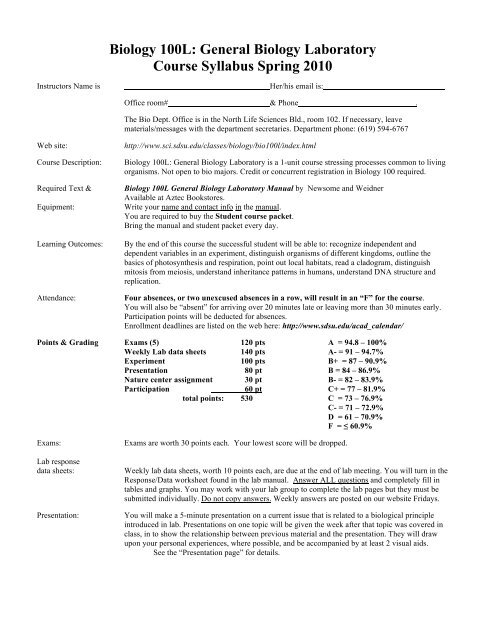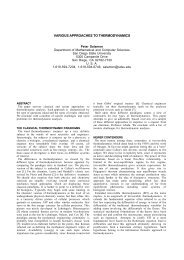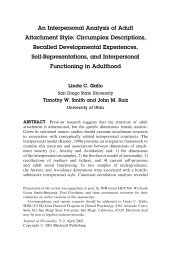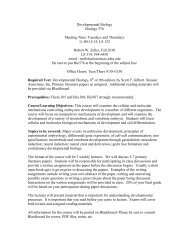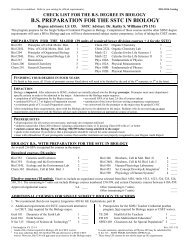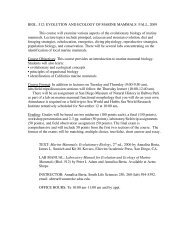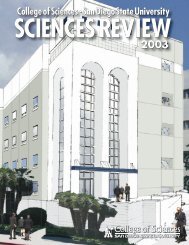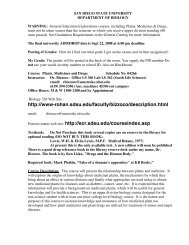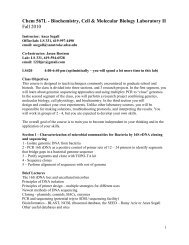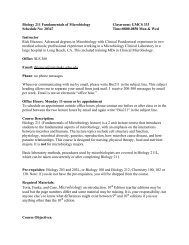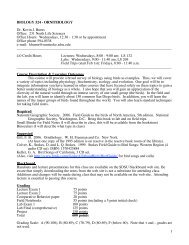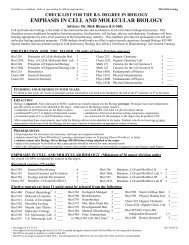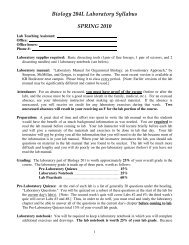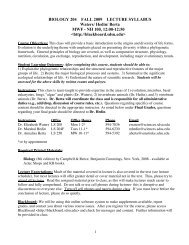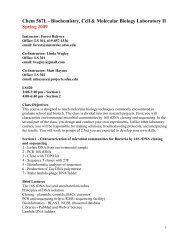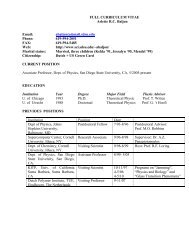Biol 100L: General Biology Lab
Biol 100L: General Biology Lab
Biol 100L: General Biology Lab
Create successful ePaper yourself
Turn your PDF publications into a flip-book with our unique Google optimized e-Paper software.
<strong>Biol</strong>ogy <strong>100L</strong>: <strong>General</strong> <strong>Biol</strong>ogy <strong>Lab</strong>oratory<br />
Course Syllabus Spring 2010<br />
Instructors Name is<br />
Her/his email is:<br />
Office room# & Phone .<br />
The Bio Dept. Office is in the North Life Sciences Bld., room 102. If necessary, leave<br />
materials/messages with the department secretaries. Department phone: (619) 594-6767<br />
Web site:<br />
Course Description:<br />
Required Text &<br />
Equipment:<br />
Learning Outcomes:<br />
Attendance:<br />
http://www.sci.sdsu.edu/classes/biology/bio100l/index.html<br />
<strong>Biol</strong>ogy <strong>100L</strong>: <strong>General</strong> <strong>Biol</strong>ogy <strong>Lab</strong>oratory is a 1-unit course stressing processes common to living<br />
organisms. Not open to bio majors. Credit or concurrent registration in <strong>Biol</strong>ogy 100 required.<br />
<strong>Biol</strong>ogy <strong>100L</strong> <strong>General</strong> <strong>Biol</strong>ogy <strong>Lab</strong>oratory Manual by Newsome and Weidner<br />
Available at Aztec Bookstores.<br />
Write your name and contact info in the manual.<br />
You are required to buy the Student course packet.<br />
Bring the manual and student packet every day.<br />
By the end of this course the successful student will be able to: recognize independent and<br />
dependent variables in an experiment, distinguish organisms of different kingdoms, outline the<br />
basics of photosynthesis and respiration, point out local habitats, read a cladogram, distinguish<br />
mitosis from meiosis, understand inheritance patterns in humans, understand DNA structure and<br />
replication.<br />
Four absences, or two unexcused absences in a row, will result in an “F” for the course.<br />
You will also be “absent” for arriving over 20 minutes late or leaving more than 30 minutes early.<br />
Participation points will be deducted for absences.<br />
Enrollment deadlines are listed on the web here: http://www.sdsu.edu/acad_calendar/<br />
Points & Grading Exams (5) 120 pts A = 94.8 – 100%<br />
Weekly <strong>Lab</strong> data sheets 140 pts A- = 91 – 94.7%<br />
Experiment 100 pts B+ = 87 – 90.9%<br />
Presentation 80 pt B = 84 – 86.9%<br />
Nature center assignment 30 pt B- = 82 – 83.9%<br />
Participation 60 pt C+ = 77 – 81.9%<br />
total points: 530 C = 73 – 76.9%<br />
C- = 71 – 72.9%<br />
D = 61 – 70.9%<br />
F = ≤ 60.9%<br />
Exams:<br />
<strong>Lab</strong> response<br />
data sheets:<br />
Presentation:<br />
Exams are worth 30 points each. Your lowest score will be dropped.<br />
Weekly lab data sheets, worth 10 points each, are due at the end of lab meeting. You will turn in the<br />
Response/Data worksheet found in the lab manual. Answer ALL questions and completely fill in<br />
tables and graphs. You may work with your lab group to complete the lab pages but they must be<br />
submitted individually. Do not copy answers. Weekly answers are posted on our website Fridays.<br />
You will make a 5-minute presentation on a current issue that is related to a biological principle<br />
introduced in lab. Presentations on one topic will be given the week after that topic was covered in<br />
class, in to show the relationship between previous material and the presentation. They will draw<br />
upon your personal experiences, where possible, and be accompanied by at least 2 visual aids.<br />
See the “Presentation page” for details.
Experiment Report: The experiment consists of a Topic selection, proposal, a draft , and a final report (total = 100<br />
points). Working alone or with a partner, you will do a simple experiment outside of class and<br />
write a brief report following scientific journal format (i.e., Introduction, Materials and Methods,<br />
Results, Discussion). See your “Experiment page” for details. Remember, you must write your own<br />
report even if you worked with someone. If you design the experiment and collect the data with<br />
someone else, beware of writing it “with them” on separate papers.<br />
Your writing must be your own thoughts in all respects.<br />
Class participation:<br />
Extra Credit:<br />
Plagiarism/Cheating:<br />
Safety:<br />
Courtesy:<br />
Points will be earned for regular attendance, being on time, being prepared, having your lab manual<br />
and student packet; showing interest, appropriate communication with the instructor via email,<br />
making appropriate use of office hours, and by participating in discussions. Conversely, points will<br />
be lost for absences, tardiness, unsafe behavior, late work, lack of preparation, failure to participate<br />
in discussions, inappropriate talking in class, misuse of the computers, forgetting the lab manual,<br />
carelessness with reagents, failure to clean after yourself, copying the work of others, etc.<br />
There is no “extra credit”. There is a lot of work assigned in this class so in a way, everyone<br />
already has “extra credit”. Exams have extra points in the form of bonus questions. Because of<br />
these bonus questions on very rare occasions someone completes Bio 100 L with over 100%.<br />
Academic dishonesty, including plagiarism on reports, or cheating on exams will result, at the<br />
minimum, in a 0 for the assignment and will be reported to the Office of Student Rights and<br />
Responsibilities and may result in probation, suspension or expulsion. Unless properly quoted and<br />
cited, all work you turn in must be yours alone. Take care when “sharing” your results with others<br />
– All assignments that show evidence of copying result in discipline, even if we know who<br />
originally wrote the text. Students violate this every semester, some “accidentally.” Don’t!<br />
You may not eat, drink (even water), open chewing gum, apply eyedrops or makeup, remove or put<br />
in your contact lenses while inside the lab rooms. These restrictions apply inside the rooms AT<br />
ALL TIMES. WHY? Because there are many sections meeting in each room and the people who<br />
sat at the lab bench before you may have spilled bacteria. You could come in, touch the computer<br />
(now bacterially-contaminated), open a bottle of water with your contaminated fingers transferring<br />
bacteria to the mouth of the bottle, take a drink, and give yourself a few million bacteria. For this<br />
reason, from the moment you first enter the room any beverages or food you have must be in your<br />
backpacks. If we see containers that are no longer factory-sealed we will make you dump out the<br />
contents. If you want to keep the container you will have to wash it and put it away empty.<br />
You must wear closed-toe shoes. Sandals, flip-flops, and other open-toed shoes are not allowed.<br />
If you are believed to have violated these safety rules the coordinator, and/or instructor, shall<br />
ask you to leave for the day and you shall receive 0 points for that day’s work.<br />
Often the door will be locked until nearly time for class to begin. We appreciate your patience.<br />
This is the time to clean and re-supply the lab, and time for your instructor to prepare. As a result,<br />
the beginning of class is a bad time to answer individual questions. Please save these for after class<br />
or during office hours. Once the next class is trying to enter the lab you need to leave the room.<br />
You are expected to keep your phone either off or set to “silent mode”.<br />
Please keep your non-biology conversations to a minimum while others are talking.<br />
If you have difficulties/problems and can’t reach your TA, contact me, the <strong>Biol</strong>ogy 100 <strong>Lab</strong> coordinator, Joe Newsome.<br />
Office PSFA 373, ph. 594-2730, email jnewsome@sunstroke.sdsu.edu.<br />
Sorry, like most instructors, I don’t return calls from pagers or long-distance phone numbers. (Get a local phone! Seriously!)<br />
This syllabus is subject to change at the discretion of the instructor/coordinator following reasonable notification to students.


